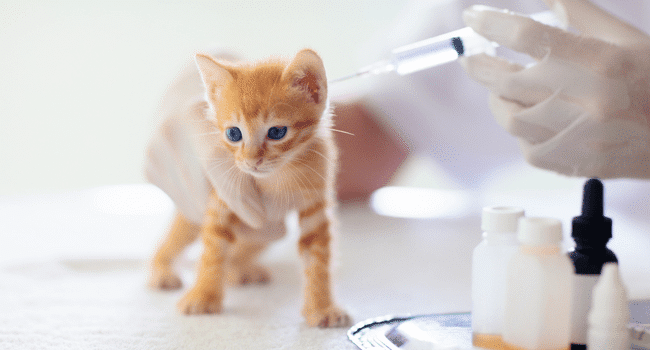Table of Contents
Kittens’ immune systems are still developing when they are born, making them defenseless against illness. Fortunately, their moms can provide them with some protection. Colostrum, a milk product high in antibodies, is given by nursing moms. These maternal antibodies provide kittens a brief immunity against disease. Each kitten’s duration of this immunity is unique. After a few weeks, the maternal antibodies’ protection usually wears off.
It is difficult to pinpoint a kitten’s exact window of vulnerability to a certain illness. Veterinarians provide immunizations to kittens at predetermined intervals in an effort to prevent illnesses. A vaccine is developed to stimulate an immune response and guard against contracting the disease in the future.
Why you need to vaccinate your kitten
Certain essential vaccinations are required for all kittens in order to protect them from the most common and serious infections. In most regions, kittens need to receive some core vaccinations. Some non-core vaccinations may also be advised depending on your region and the environment your kitten is exposed to. Consult your veterinarian about the likelihood that your kitten will get these illnesses.
Vaccinations for Kittens
- 6-8 weeks
FVRCP, FeLV/FIV test (optional: deworm)
- 9-11 weeks
FVRCP booster, FeLV, (optional: deworm, begin heartworm/flea prevention)
- 12-15 weeks
FVRCP booster, FeLV (optional: deworm)
- 16-20 weeks
FVRCP final booster, Rabies (optional: fecal exam, FeLV/FI test)
Note: The above-mentioned vaccination schedule is only a sample, kindly consult your vet for a proper vaccination schedule for your kitten, cat, dog. Regarding the sequence and regularity of additional operations like exams, deworming, and testing, every veterinarian has their own preferences. Discuss the ideal timetable for your kitten with your veterinarian.
Rabies
The deadly rabies virus may infect both people and cats. 2 Due to the severity of this disease, this is a fundamental vaccination that is typically mandated by legislation. Rabies vaccinations should be given to all kittens and adult cats.
FVRCP
Cat-specific viral rhinotracheitis, calicivirus, and panleukopenia is referred to as FVRCP. This basic vaccination is thought to be necessary for all kittens. Common feline viruses like calicivirus and rhinotracheitis are known to cause upper respiratory illnesses in cats. Panleukopenia, often known as feline distemper, is a highly infectious and frequently deadly illness that targets quickly dividing and growing cells, including those found in the bone marrow, the developing fetus, and the intestines.
FeLV
The FeLV vaccination, which protects against the feline leukemia virus, is optional for low-risk adult cats but is frequently required for all kittens under a year old. Every year, adult cats that will spend time outside should receive this booster shot. One of the most prevalent infectious illnesses affecting cats is feline leukemia. The main method of transmission is interpersonal contact with sick animals. Cats that have FeLV are more likely to develop cancer and immune system problems.
FIV
FIV, or feline immunodeficiency virus, is a widespread feline virus that is most frequently transmitted through bite wounds. In North America, this vaccination is no longer accessible. It was regarded as optional and advised only for cats with a very high chance of FIV exposure. Despite the fact that many FIV-positive cats can have normal lives, those that are negatively impacted can experience a variety of ailments because of immune system malfunction.
Is Vaccination cost covered in Pet Insurance?
Since routine vaccinations are a sort of preventative care, or routine treatment to help your pet keep a clean bill of health, standard pet insurance or cat insurance policies often do not cover them. Preventive care treatments are frequently excluded from regular pet insurance plans, while coverage varies amongst pet insurance policies. Preventive care includes a variety of health treatments, including parasite examinations, spay/neuter surgeries, microchipping, grooming, regular dental cleanings, and more. These will often be noted under the exclusions section of your plan policy paper if they are not covered. However, there are certain insurance companies that provide vaccination coverage as special add-ons.
Accident and sickness coverage are often offered in standard cat insurance and pet insurance plan options. They are therefore created to assist pet parents in paying for the qualified veterinary treatment that their animals require when unanticipated covered accidents or diseases occur. Pet insurance helps by covering a percentage of pet owners veterinary expenses.
Although coverage varies across pet insurance policies, routine vaccinations are frequently excluded since they are a type of preventive treatment, or routine care that is intended to keep your pet healthy. Spay/neuter treatments, microchipping, parasite testing, and other procedures fall under the category of preventative care.
Read more on KulFiy
Here’s How to Easily Maintain Your Cat’s Health
